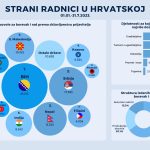The Croatian finals of the RBA competition brought together seven innovative startups.
As Bernard Ivezic/Poslovni Dnevnik writes on the 1st of September, 2019, the fastest growing Croatian startup, Electrocoin, has been in talks of an offer with largest cooperative bank in Austria and one of the largest banks in Southeast Europe, Raiffeisen Bank (RBA), to jointly launch a “cryptocurrency”.
The successful Croatian startup presented its service, known as PayCek, the first Croatian payment processor for cryptocurrencies at the Croatian finals of the Elevator Lab Challenge, organised for the first time in Zagreb by RBA and Startit.
Vedran Vukelić of Electrocoin says that with PayCek, which has attracted more than 40 businesses in just three months, they now want to go one step further and make it a tool that will bring the market a new form of cash, the so-called, cash 2.0, thus replacing the need to carry paper kuna and coins.
“We have five years of experience in the crypto world, with an average of 30 million euros in annual revenue, 5,000 active users in more than 30 countries, we work with Croatian Post, Greyp, the Red Cross, leading POS players and now we want to introduce an e-wallet that would allow you to have kuna in electronic form on your mobile phone as opposed to carrying them in a wallet,” said Vukelić.
He added that they need RBA because, although they will use crypto technologies, they must have a deposit in the bank for every kuna they issue to their PayCek e-wallet. Instead of operating their own bank and needing very costly licenses and complex regulatory approvals, Vukelić points out, they decided to look for a partner that is already part of that world and of its core business. Electrocoin grew 932 times to a massive 206.9 million kuna from 2015 to 2017, thanks to the cryptocurrency exchange service. Last year, according to Fina, it slowed its growth down to 207.7 million kuna.
“In order to issue a crypto kuna or eHRK and allow it to be paid everywhere, we need a bank. This means that users will not need a bank account to pay for eHRK, which will significantly simplify payments, and will also allow for some new services, such as having children receive pocket money directly on their mobile phones,” says Vukelić, adding that they want to do this, as their previous services have been done, in collaboration with domestic regulators.
Seven startups gathered in the Croatian finals of the Elevator Lab Challenge in Zagreb. Nevenka Rangelov of Startit says she is very pleased with it all, given that RBA has never organised such competitions in Croatia before.
Make sure to follow our dedicated Made in Croatia and business pages for much more on Croatian innovation.







